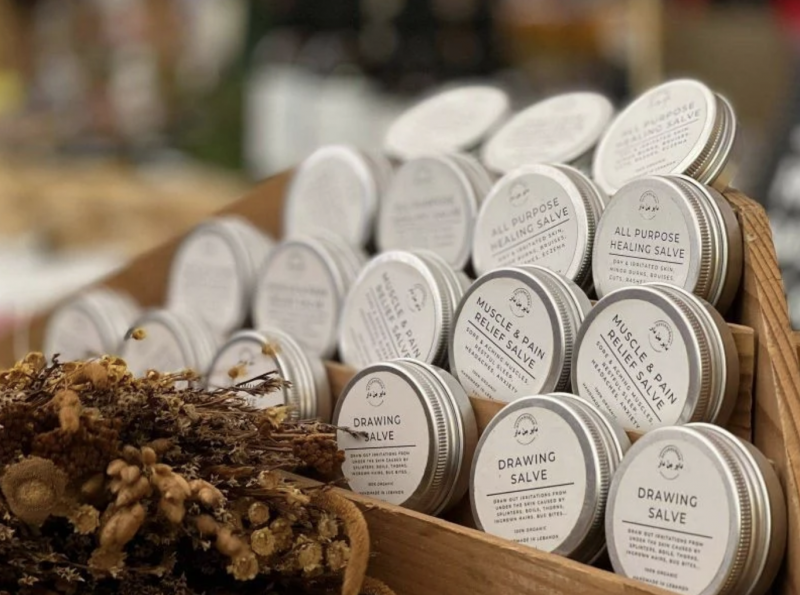
Products, mainly salves and creams, all herbal and homemade, based on a grandmother's recipes. (Credit: Joelle Abu Chabkeh)
Melhem Sayde (37) and Joelle Abu Chabkeh (36) sat in the living room of their flat in the agricultural plain of Ferzol, nestled in central Bekaa, with a traditional charcoal stove warming the room.
Just a few years ago, Abu Chabkeh, a cinema graduate, pursued her entrepreneurial ventures in Paris, while Melhem worked for a prominent engineering company split between Lebanon and Saudi Arabia.
They recounted a journey back to the land and the essentials through Deyermendar their budding company specializing in agricultural products and natural, plant-based remedies.
“In 2016, following the fallout of the failed protests amid the waste crisis [anti-corruption demonstrations were organized in 2015 against a backdrop of streets strewn with piles of rubbish and corruption scandals], I felt disconnected from this country, and I set sail for Paris,” Abu Chabkeh said.
It took the COVID-19 pandemic and months of confinement to a 28-square-meter flat to make her realize she needed a lifestyle change.
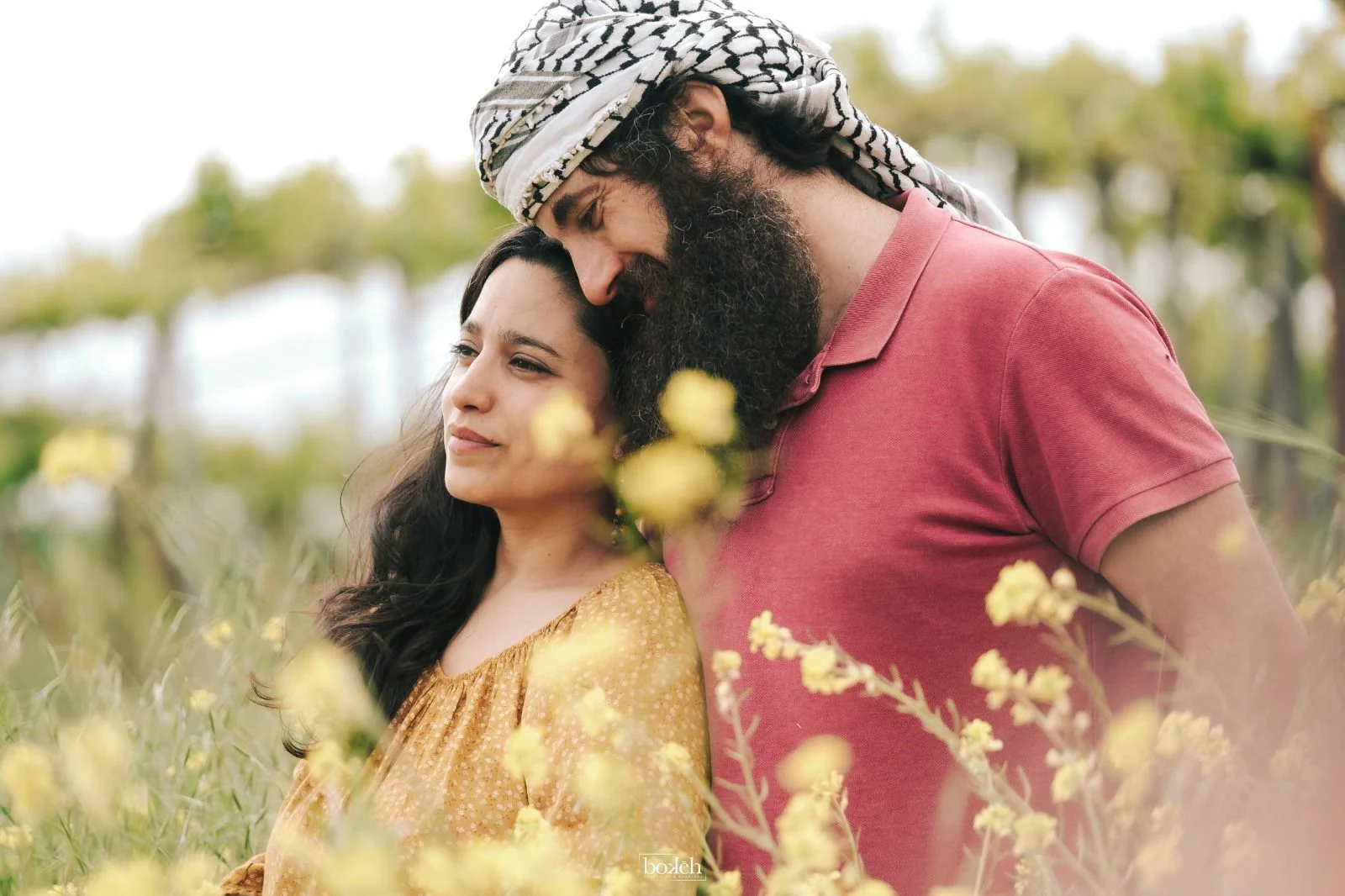 Joelle and Melhem, a journey towards a shared philosophy of life. (Credit: @Bokeh)
Joelle and Melhem, a journey towards a shared philosophy of life. (Credit: @Bokeh)
“The transformation was already underway within me, as I seized the opportunity during this period to enroll in online courses on herbal medicine and delve into permaculture [farming practices aimed at fostering a harmonious and sustainable environment],” she recalled.
Sayde frequently traveled between Lebanon and Saudi Arabia for work and found himself stranded in the latter for six months during the pandemic. He was confined within the four walls of a hotel room due to the closure of Beirut International Airport in February 2020.
Sayde embarked on a strikingly similar journey as Abu Chabkeh, without either of them realizing it He longed to reconnect with his roots that led him back to the family farmland, which had lain abandoned since his grandfather’s time, nestled in the lush agricultural plain of Ferzol.
Back in their homeland, they connected through social networks, drawn together by a shared interest in ecological and virtuous farming practices and the accompanying philosophy of life.
“He invited me one day to visit Ferzol, and this tranquil and timeless place was a revelation for me,” Abu Chabkeh said.
Flowers, plants, fruits and vegetables
Married for a year, the young couple cultivated Sayde’s family’s 80,000 square meters of farmland, temporarily putting aside their respective careers.
“We had to immerse ourselves in farming and gradually conduct our experiments,” Sayde said.
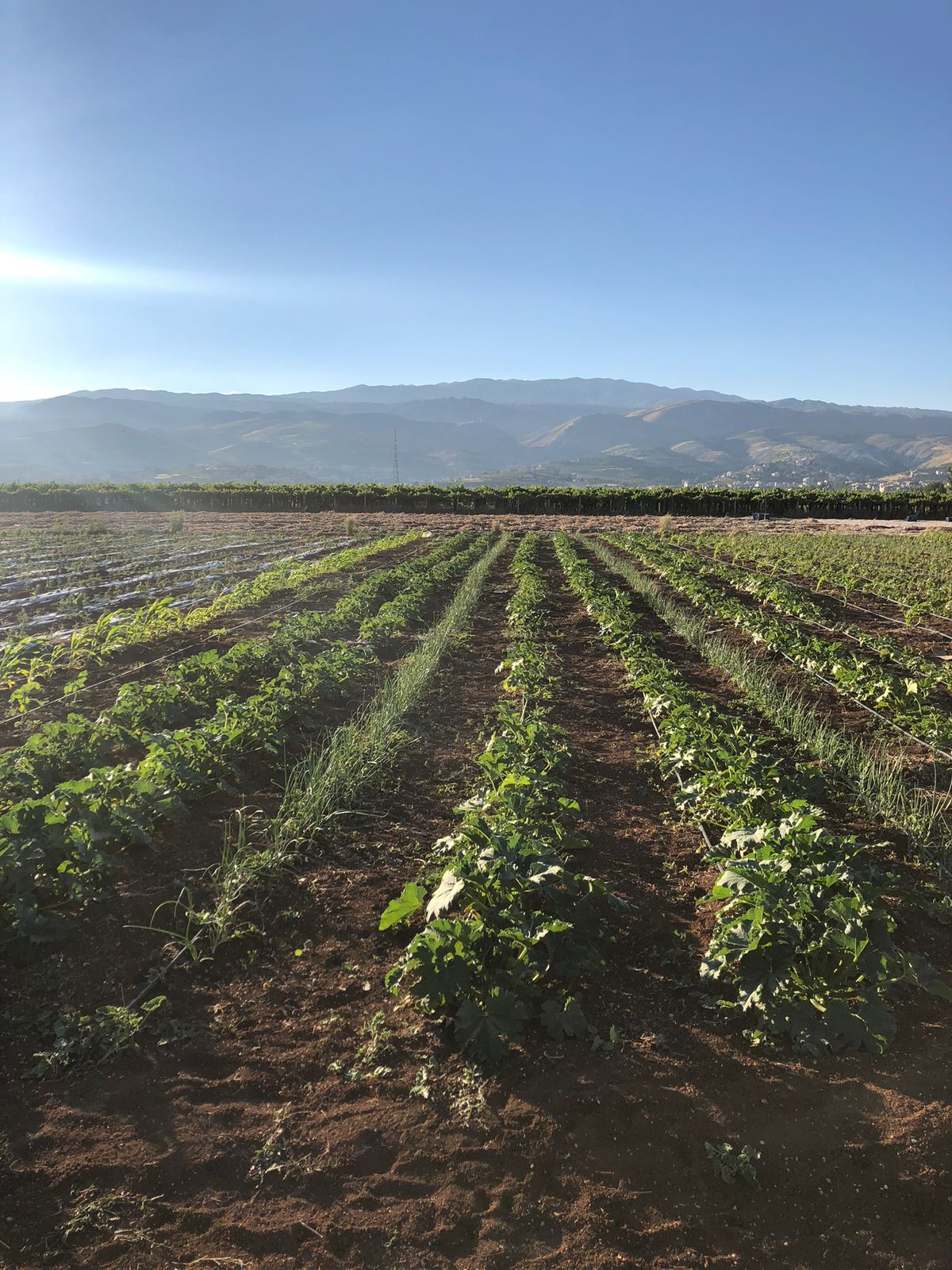 Farmland in the village of Ferzol in the Bekaa, where the project originated. (Credit: Joelle Abu Chabkeh)
Farmland in the village of Ferzol in the Bekaa, where the project originated. (Credit: Joelle Abu Chabkeh)
The couple opted for permaculture, a method that cultivates diverse crops within the same field, in contrast to the monoculture prevalent in neighboring fields.
The distinction is evident at first glance: Their fields exude a sense of joyful disorder. In reality, they adhere closely to the imperatives of nature.
“As plants and flowers naturally thrived amidst the fruits and vegetables, we pondered over their potential uses,” Abu Chabkeh said. “That’s when the idea for the plant-based ‘grandmother’s remedies’ originated.”
Abu Chabkeh crafts these remedies through her research and training and produces them in a workshop set up in a room within their home.
This product line’s name Deyermendar originates from the Lebanese dialect spoken in Ferzol, meaning “all around.”
“The name reflects the scattered nature of my family’s plots, as is common for plots in Ferzol, spread across varying altitudes within the village,” Sayde explained.
Among the products offered are an anti-dryness and anti-allergy cream crafted from Calendula, a cream designed to alleviate insect bites formulated with citronella and a muscle ache relief cream made from locally sourced beeswax. They also include a lip balm derived from beeswax, an immunity-boosting product created from black elderflower, an anti-migraine ointment infused with peppermint and a soothing ointment enriched with lavender.
“Our entire range is sourced from ingredients grown on our own land or obtained from neighboring farms, emphasizing our commitment to local sourcing,” said Sayde.
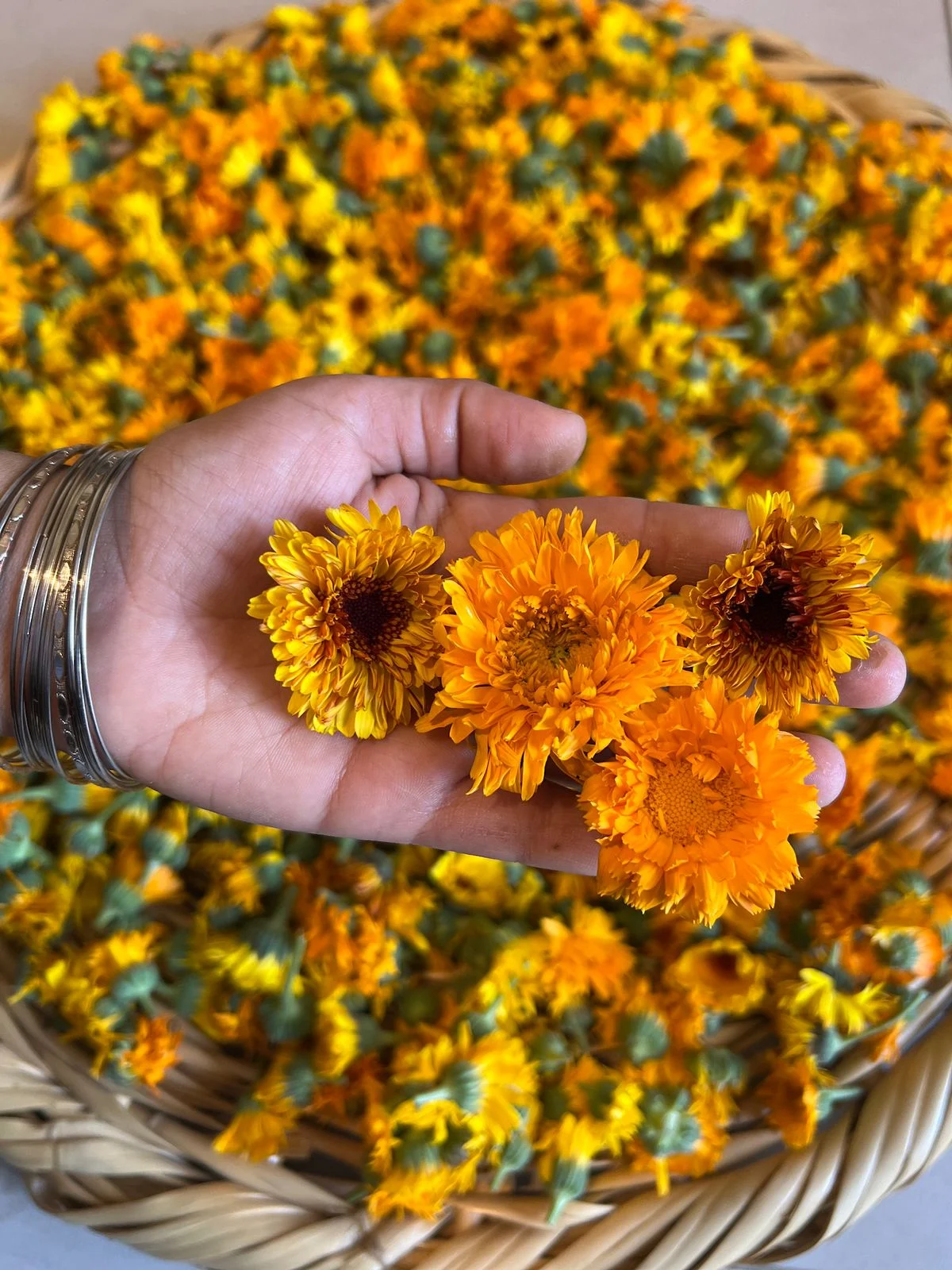 Marigolds or Celendula, a flower used in abundance in Deyermendar's natural remedies. (Credit: Joelle Abu Chabkeh)
Marigolds or Celendula, a flower used in abundance in Deyermendar's natural remedies. (Credit: Joelle Abu Chabkeh)
Taking it slowly
Determining the exact financial investment in the project proved challenging for the couple.
“The investment in the farming project was gradual and spread over several years,” Sayde said.
However, he underscored that the profits generated by Deyermendar now allow the project to break even.
“The most significant costs are electricity and fuel,” he explained. “Regarding electricity, we’re considering investing in a solar-powered water pump, despite its initial high cost, as it will be cost-effective given the escalating energy expenses.”
Deyermendar’s products resonate with an increasingly nature-conscious public and are showcased in curated shops across Beirut and its suburbs, catering to a market currently confined to Lebanon.
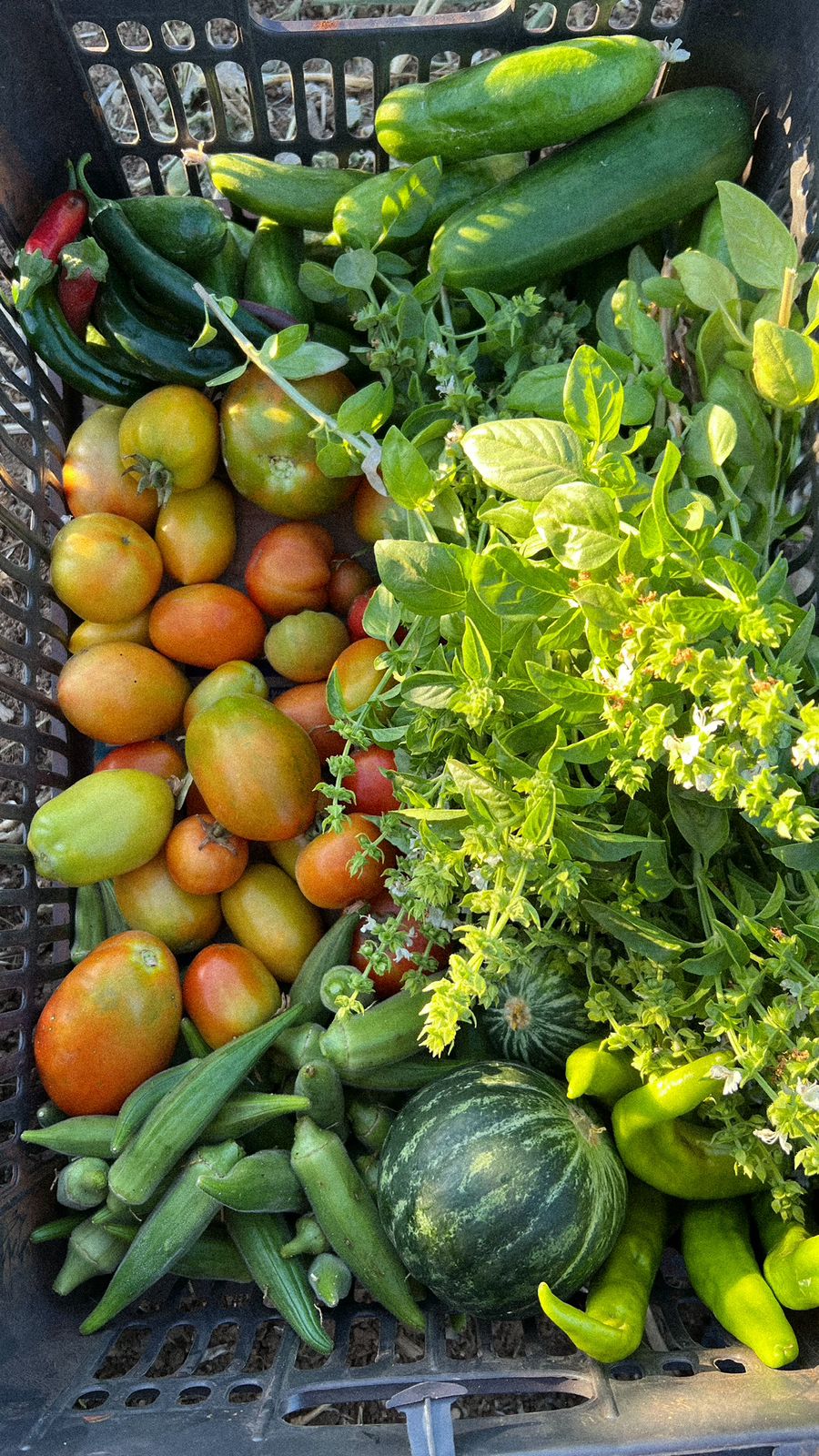 Fruits and vegetables grown on their land. (Credit: Joelle Abu Chabkeh)
Fruits and vegetables grown on their land. (Credit: Joelle Abu Chabkeh)
The couple prioritizes respect for the land’s production and seasonal rhythms, preferring a gradual, unhurried approach.
“What brought us to this project was a lifestyle decision — a return to our roots and to the essentials,” Abu Chabkeh said. “We’re keen to avoid it becoming a frenetic pace akin to our previous experiences.”
The couple hasn’t abandoned their aspirations for the future. They’ve both resumed their respective careers to fund their plans. In addition to cultivating their farmland and expanding their product line, their boldest dream is to construct an ecological house using traditional materials, nestled high in the village.
This envisioned space would serve as their home and a venue for organizing various activities.
This article was originally published in L'Orient-Le Jour. Translated by Sahar Ghoussoub.